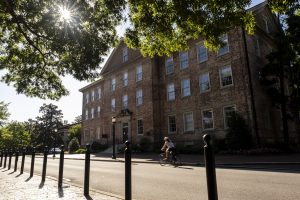Royster Global Conference Doctoral Students Participants Focus on Tenacity in Turbulent Times
July 1, 2021Graduate School

Summer campus scene at South Building on the campus of the University of North Carolina at Chapel Hill. June 28, 2021. (Jon Gardiner/UNC-Chapel Hill)
For the month of June, doctoral students from around the world came together for the fifth annual Royster Global conference, designed to increase an understanding of graduate education and foster connections internationally. The interdisciplinary conference is sponsored by the Royster Society of Fellows and is an initiative of the Graduate School at the University of North Carolina at Chapel Hill. Its participants benefitted from the conference, titled “Tenacity in Turbulent Times,” in myriad ways, including by participating in issue-based discussions that fostered opportunities for research and networking.
The 2021 conference, held online due to the COVID-19 pandemic, provided a forum for graduate students to reflect on recent crises within the context of academic instruction and research; to identify strategies for coping and overcoming challenges; and to apply lessons learned in broad contexts within universities and societies.
The conference drew 29 participants, including 14 Royster fellows and 15 doctoral students from outside the U.S. Those students hailed from institutions including King’s College London; Hamburg University; Tübingen University in Germany; Tampere University in Finland; and the National University of Singapore.
Throughout the Royster Global experience, participants used the PhotoVoice research method to describe crises and solutions, including the pandemic and systemic racism. For example, Michael Baird, a doctoral candidate in the Department of Art & Art History at UNC-Chapel Hill, reflected on the challenges of moving to a new city during a pandemic and balancing a desire to safely socialize.
“I often turned to FaceTime, but after spending all day attending Zoom classes and meetings—also within the confines of my apartment—I frequently felt more socially drained after hanging up,” Baird said. Baird said he found that giving himself time to decompress and allow for self-care allowed for him to participate in activities beyond those in academia.
Oladayo Afolabi, a postgraduate research scholar at King’s College London, said he turned to his passion for music during the pandemic and other issues he faced in recent years.
“When I’m sad, I sing; I play,” Afolabi said. “When the world around me is falling down, I find strength to go on, in my song, in my keys.”
Chris Lane (’19 DPT), a doctoral student in the Human Movement Science Curriculum at Carolina, said the Royster Global conference allowed for participants to discuss issues like anti-racism within a global context. Noting that issues that stem from systemic racism can contribute to health disparities and health outcomes. Lane, a physical therapist and researcher, said he hopes that anti-racism advocacy will lead to action and change.
“This last year has brought about a lot of discussion,” Lane said. “Now, we need action for change. … These issues are not unique to America; there are similar issues in other countries.”
The outgoing Caroline H. and Thomas S. Royster Distinguished Professor for Graduate Education, Banu Gökariksel, said she has learned from doctoral students during her three-year term at the helm of the Royster Society of Fellows. Gökariksel is a professor in the Department of Geography and will be succeeded by Tori Ekstrand (’03 Ph.D.), an associate professor in the UNC Hussman School of Journalism and Media.
“I’ve learned so much from these students’ work and who they are,” Gökariksel said. “Royster Global is very special because it allows us to connect internationally. … We have so many people from such different backgrounds, and I really value these connections we are making.”
Dean of the Graduate School, Suzanne Barbour, said turbulence can necessitate change.
“You all are the next generation of thought leaders and action leaders,” Barbour said. “You will lead our institutions, your communities, the nations, and the world as you navigate the changes that are yet to come.”
She encouraged graduate students to find local solutions that can affect world-wide problems. Barbour explained the impact she hopes the Royster Global conference will have on its participants by likening their work to ripples in the water—based on imagery in a familiar quotation by Mother Teresa.
“I hope this Royster Global conference will help you make your own ripples, and that you will continue to be resilient in turbulent times,” Barbour said.
Katie Bowler Young, interim senior director for Global Partnership and Programs in the Office of the Vice Provost for Global Affairs, said the conference is a tool for equity and increasing access in education.
“You are the heart of our partnership work, and you keep the connections between our institutions alive and vibrant,” Young said. “Bringing so many people together really brings us the ability to advance joint scholarship and collaboration across disciplines, which continues to design the future of the production of knowledge.”
Young has worked to develop Carolina’s first Collaborative Online International Learning (COIL) program, which creates opportunities for shared learning between students at UNC-Chapel Hill and peer students at a global university.
“The work that has been accomplished by our graduate students in creating virtual connections for peers at conferences was the spark that helped me see what was possible,” Young said. “Carolina has created several opportunities for students to experience and to have access to global education in their classrooms.”
Additional speakers during the Royster Global conference included Mimi Chapman, a professor at the UNC School of Social Work; Diamond Holloman, a doctoral candidate and Royster fellow with the Environment, Ecology and Energy program; and Shemul Milwani, an associate professor at the Kenan-Flagler Business School.
A team of nine Royster fellows worked with staff at The Graduate School to organize this year’s conference.
